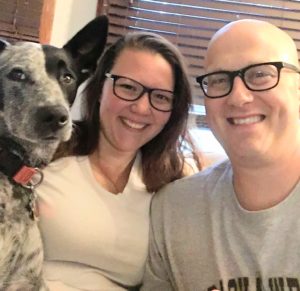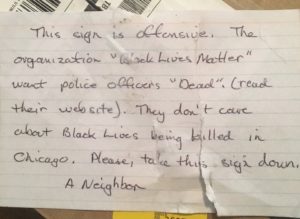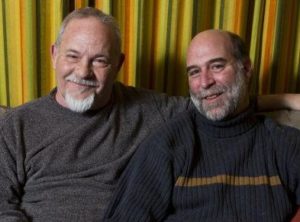Someone in Lincoln, Neb., picked the wrong Black Lives Matter yard sign to protest in an anonymous note demanding its removal.

The original yard sign.
For not only did Erin Palmer and Jonathan Redding keep the “offensive” sign in their yard, they added a few more and embarked on a get-to-know-your-neighbor campaign that has generated new friendships and several new BLM signs in the neighborhood.
“It has been affirming, although we didn’t do it for the affirmation,” said Redding, a Baptist minister who grew up surrounded by Ku Klux Klan activity in North Carolina. “My parents taught us to stand up to bullies. It’s the same with Erin.”
Palmer said some neighbors have taken to openly supporting Black Lives Matter on social media since the note appeared on their sign July 1. The incident also resulted in more play dates for their dog, Pippa. “It’s helping us put down roots in this community,” she said.
The couple moved to Lincoln three years ago. Palmer works in the advancement office at Nebraska Wesleyan University, where Redding is an associate professor of religion.
But the couple was active in protest movements well before arriving in Lincoln.
“We have been vocal about our support for Black Lives Matter since Ferguson,” Palmer said, referencing the Missouri city engulfed in protests after the 2014 police shooting of teenager Michael Brown. Palmer and Redding lived in Nashville, Tenn., at the time and participated in protests there.
But they were actively looking for ways to get involved in their current hometown after George Floyd was killed in May by police in Minneapolis. They recently attended protests in Lincoln, where Redding was handed the simple yard sign. “There was no question about putting it in the yard,” Palmer said.
‘We were angry at first’
That was on June 28. It was the morning of July 1, as Redding set out on a walk with Pippa, that he discovered the hand-written note attached to the sign.

Pippa, Erin Palmer and Jeremy Redding.
“This sign is offensive,” the note began. It claimed the Black Lives Matter movement seeks the death of police officers and doesn’t care about all Black deaths. “Please take this sign down,” the note concluded. It was signed simply, “A Neighbor.”
The couple’s first response came on social media.
“We were angry at first,” Redding posted on Facebook. “But how did we elect to respond? By first buying two more signs that show our love for Black Lives Matter and second by writing up a note of our own for everyone on our street. We included our names, address and picture.”
That was on July 2. The first response came from a neighbor who appeared at their front door that night. “That’s not who we are,” she said in apology for the anonymous note.
Since then, Palmer and Redding have gotten to know many other neighbors. He said the experience demonstrates the power of unity.
“It shows we are not intimidated and that there are more of us than the hypothetical ‘them,’” said Redding, also a Methodist supply preacher who was ordained at Peace Haven Baptist Church in Winston-Salem, N.C. and earned a master of divinity degree at the Wake Forest University School of Divinity.

“There are more of us who believe in Black Lives Matter, that police should not shoot without cause, and that social inequities are real and need to be addressed.”
The anonymity of the letter illustrates what Redding said he learned growing up in the rural South. “That’s what cowards do. They put things down and run and hide — like the Klan does with their faces covered.”
Palmer said the note, and the relationships it has created, reinforces the need for neighbors to know each other. “We talked about writing letters but hadn’t gotten around to it yet.”
‘At some point I would thank them’
Neighbors Bil and Greg Roby-Tubach said they were grateful to get the letter from the couple.
“I thought, you know what? No one should feel isolated in their neighborhood,” Bil said. He Googled Redding and they were soon exchanging texts. “We met in our backyard and chatted and started getting to know each other. It’s turned out to be a positive for the whole neighborhood.”
Greg said he and his spouse — who were part of the group that successfully sued for same-sex marriage in Nebraska — support their neighbors’ efforts to promote the Black Lives Matter movement.

Bil, left, and Greg Roby-Tubach.
What he doesn’t understand is how Palmer and Redding were so diplomatic in response to the note. “That letter they wrote — I would never have been so calm.”
Bil said the note has turned into a good-news story that he believes the media too rarely shares. “It reconfirms to me that there are many more positive, good people in this world than there are note writers who don’t have any courage.”
Redding said it hasn’t always been easy keeping his cool throughout the process. He admitted to wanting to confront the note-writer with a touch of “snark” and informed dialogue.
But now, he would thank whoever wrote the note. “At some point I would thank them. It would be a very cynical thank you. But we know our neighbors better now.”
